Conflict in the Mexican-American War in 1846 saw the first significant presence of Marines on the West Coast in San Diego, Calif. In 1911, Mexican civil disorder brought Marines once again to Southern California, but the 4th Provisional Marine Regiment was disbanded when tensions eased.
In 1914, following the temporary bivouacs of Camp Thomas and Camp Howard on North Island in the San Diego Bay, 250 Marines temporarily settled at Balboa Park in San Diego.
In 1915, then Marine Col. Joseph H. Pendleton advocated the establishment of a permanent Marine presence in San Diego to the Commandant of the Marine Corps and Congressman William Kettner. Proximity to the Mexican border and the southernmost deep-water harbor on the West Coast made San Diego a strategic location for a Marine base. Meanwhile, increasing national interest in Central America and the Pacific supported Col. Pendleton’s argument for an advanced expeditionary base on the West Coast. (right, Maj. Gen. Joseph H. Pendleton)
In 1916, appropriation was approved for Marine construction in San Diego. Full scale construction was delayed with the U.S. entry into World War I, but in 1921 Dutch Flats was fully operational and Marine Advanced Expeditionary Base San Diego was established. In November, 1920, a rifle range, later named Camp Matthews, was activated in La Jolla.
In 1924, Marine Corps Base, Naval Operating Base San Diego was established hosting the 4th Marine Regiment and a facility to train recruits. In 1948, this base was re-designated (to/as) Marine Corps Recruit Depot, San Diego and has since served solely to train recruits.
In the early 1930s, Marines shared training grounds with the Army at Camp Kearny in northern San Diego. Growing tensions in Europe and the Pacific expedited the need for dedicated Marine training grounds for gunnery. In 1934, to provide needed space for recruit training expansion as well as a dedicated range for machine gun, anti-aircraft and artillery training, the Fleet Marine Force units moved from the San Diego Base to a bivouac site named Camp Holcomb in the Kearny Mesa area of San Diego. After construction of permanent fixtures, in 1940, it was renamed Camp Elliott. During World War II, Camp Elliott served as training grounds for tank, parachute, artillery, and scout training. The famous Navajo code talkers were also trained at Camp Elliott prior to their service in the Pacific. In 1944 after training over 50,000 Marines bound for the war in the Pacific, Camp Elliott was turned over to the Navy and in 1960, most of the property was returned to the city of San Diego.
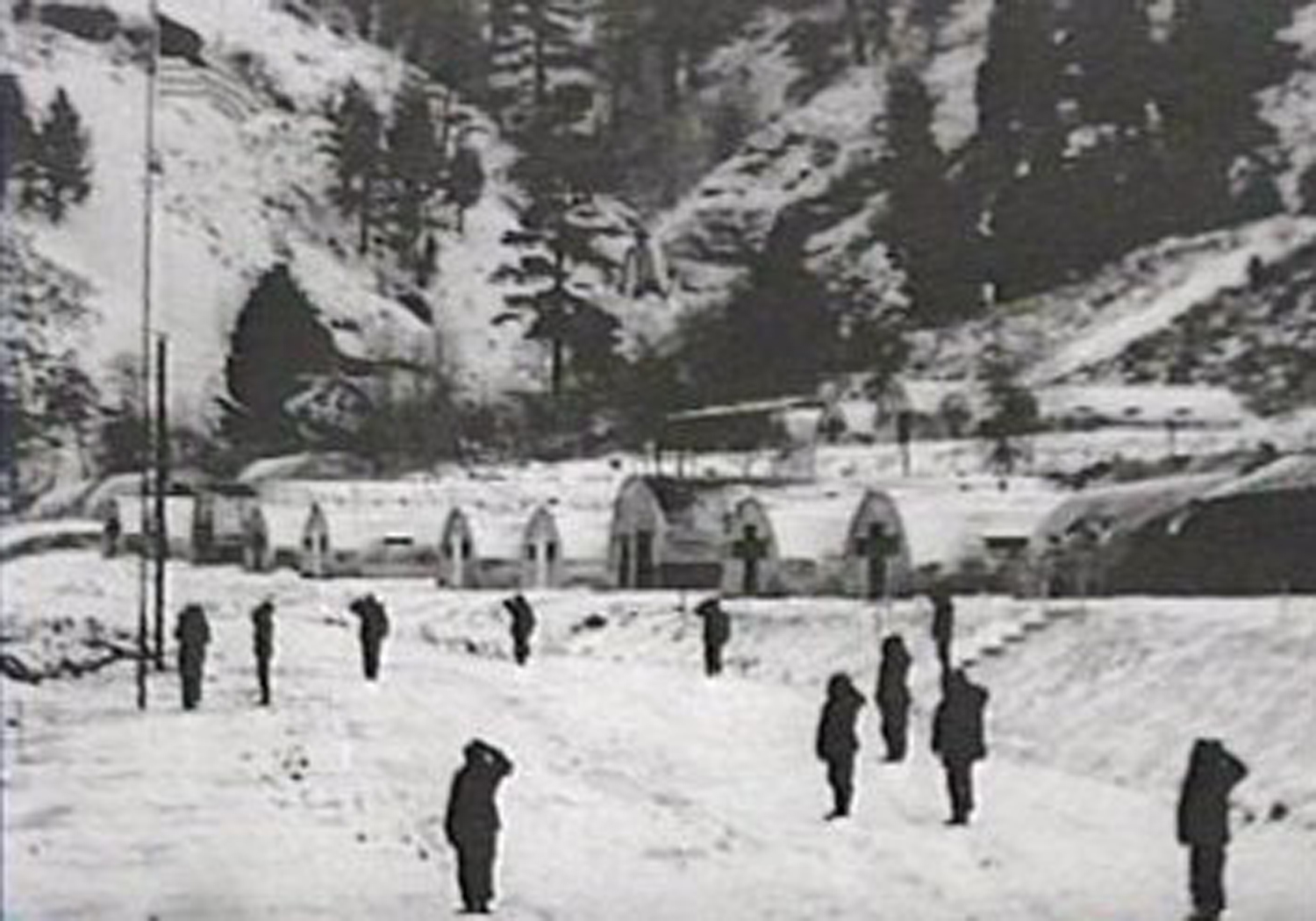 The Marine Corps Mountain Warfare Training Center (MCMWTC) was established in 1951 as Cold Weather Battalion at Pickle Meadow, Calif., near Bridgeport, Calif. Its mission was to provide cold weather training for replacement personnel bound for the conflict in Korea. After the conflict, the name was changed to the Marine Corps Cold Weather Training Center. As a result of its expanded role in training Marines for the Soviet threat in Northern Europe, it was renamed the Marine Corps Mountain Warfare Training Center in 1963. MCMWTC operated on a full time basis until 1967 when it was placed in a caretaker status during the Vietnam conflict. The training center was reactivated to a full-time command on May 19, 1976. Today, the installation supports training for mountain and cold-weather warfare though its unit training group and formal schools. (right, Marines salute the morning colors at the Cold Weather Battalion, circa 1952.
The Marine Corps Mountain Warfare Training Center (MCMWTC) was established in 1951 as Cold Weather Battalion at Pickle Meadow, Calif., near Bridgeport, Calif. Its mission was to provide cold weather training for replacement personnel bound for the conflict in Korea. After the conflict, the name was changed to the Marine Corps Cold Weather Training Center. As a result of its expanded role in training Marines for the Soviet threat in Northern Europe, it was renamed the Marine Corps Mountain Warfare Training Center in 1963. MCMWTC operated on a full time basis until 1967 when it was placed in a caretaker status during the Vietnam conflict. The training center was reactivated to a full-time command on May 19, 1976. Today, the installation supports training for mountain and cold-weather warfare though its unit training group and formal schools. (right, Marines salute the morning colors at the Cold Weather Battalion, circa 1952.
On S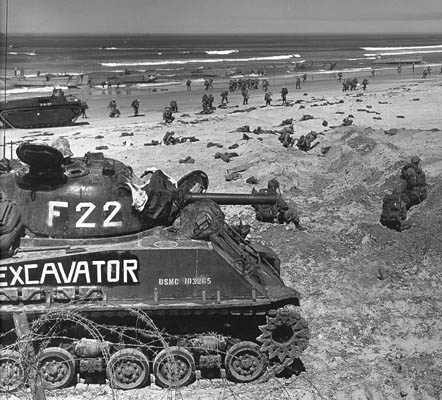 ept. 25, 1942, President Franklin D. Roosevelt officially dedicated Marine Corps Base Camp Pendleton, establishing a large-scale ground training facility for Marine island-hopping operations in the Pacific. Major General Joseph H. Pendleton had long advocated the establishment of a permanent West Coast training base, and his vision had been realized beyond his expectations.
ept. 25, 1942, President Franklin D. Roosevelt officially dedicated Marine Corps Base Camp Pendleton, establishing a large-scale ground training facility for Marine island-hopping operations in the Pacific. Major General Joseph H. Pendleton had long advocated the establishment of a permanent West Coast training base, and his vision had been realized beyond his expectations.
Marines from the 9th Marin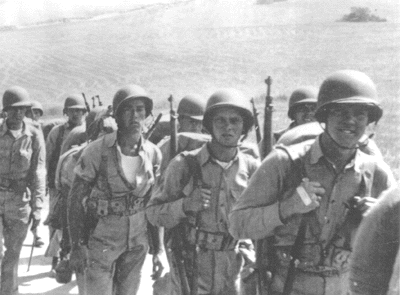 e Regiment conducted a four-day march from Camp Kearny to
e Regiment conducted a four-day march from Camp Kearny to
Camp Pendleton to be the first Marine unit to inhabit the newly acquired base. Virtually overnight, Camp Pendleton transformed from a peaceful cattle ranch to a fast-paced military training installation capable of training thousands of Marines bound for the Pacific.
(left, Marines from the 9th Marine Regiment hike 38 miles from San Diego to Camp Pendleton, September 1942.)
An auxiliary landing airfield at Camp Pendleton was included in the
1942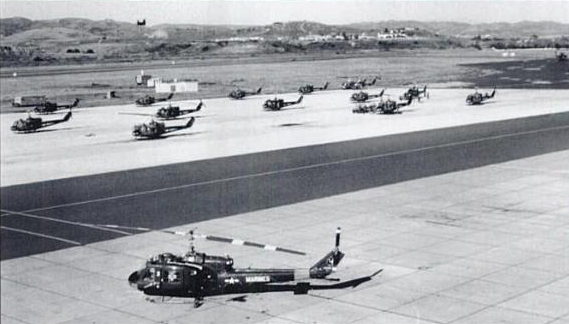 construction. During World War II, the dirt air strip served as a training field for the nearby Navy and Marine Corps air stations and provided basic fuel and maintenance functions. In 1978, after gradual ramp and runway improvements, the airfield was designated as a Marine Corps air facility and became home of Marine Air Group 39. In 1987, the facility became a full-fledged air station and today hosts the highest concentration of helicopters of all Marine Corps air stations.
construction. During World War II, the dirt air strip served as a training field for the nearby Navy and Marine Corps air stations and provided basic fuel and maintenance functions. In 1978, after gradual ramp and runway improvements, the airfield was designated as a Marine Corps air facility and became home of Marine Air Group 39. In 1987, the facility became a full-fledged air station and today hosts the highest concentration of helicopters of all Marine Corps air stations.
(right, UH-1s parked at MCAS Camp Pendleton, circa 1970.)
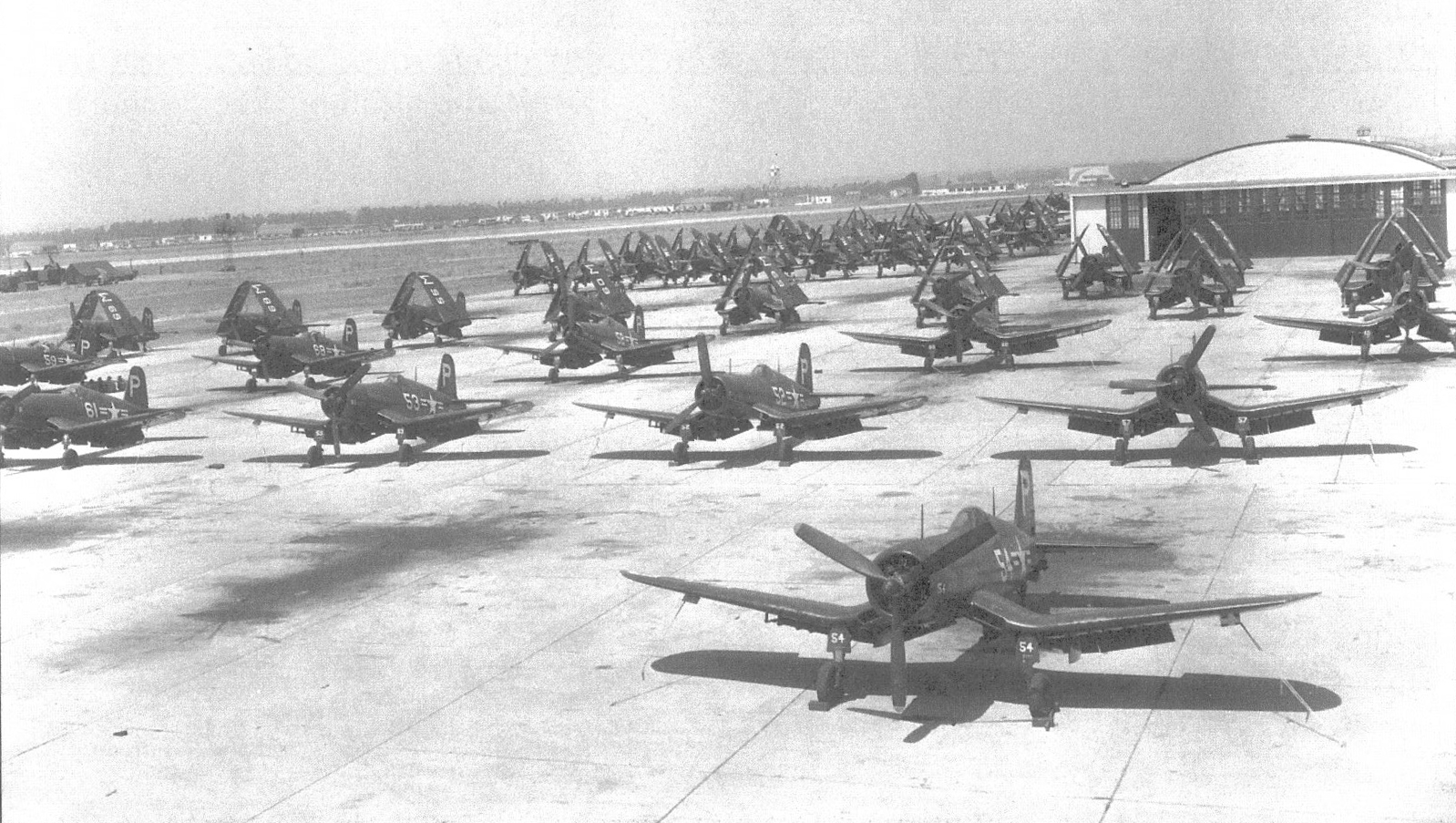 Shortly after the completion of Camp Pendleton, on Nov. 4, 1942, Marine Corps Air Station El Toro was established in a small bean farming community in Orange County, Calif. to train aviation units battling in the Pacific. In 1950, MCAS El Toro was designated Master Jet Base for Fleet Marine Forces, Pacific and flourished as the home station of the 3d Marine Aircraft Wing. In 1993, the base was designated for closure in the Base Realignment and Closure process. The base closed in July, 1999.
Shortly after the completion of Camp Pendleton, on Nov. 4, 1942, Marine Corps Air Station El Toro was established in a small bean farming community in Orange County, Calif. to train aviation units battling in the Pacific. In 1950, MCAS El Toro was designated Master Jet Base for Fleet Marine Forces, Pacific and flourished as the home station of the 3d Marine Aircraft Wing. In 1993, the base was designated for closure in the Base Realignment and Closure process. The base closed in July, 1999.
(right, Marine F-4U Corsairs parked at MCAS El Toro, circa 1949)
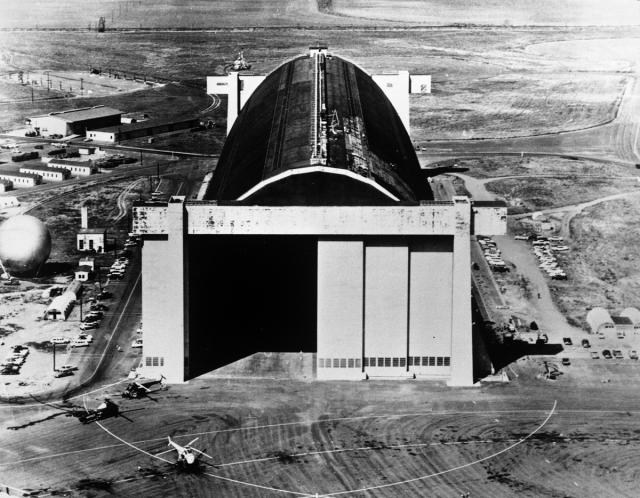 In 1951, in response to the need for dedicated helicopter operations, a Navy airship base named Naval Air Station Santa Ana was commissioned Marine Corps Air Station Santa Ana to support the Korean conflict. It was the nation’s first installation dedicated solely for helicopter operations and was renamed Marine Corps Air Station Tustin in 1970. As a result of the 1993 BRAC review, the base was closed in 1997.
In 1951, in response to the need for dedicated helicopter operations, a Navy airship base named Naval Air Station Santa Ana was commissioned Marine Corps Air Station Santa Ana to support the Korean conflict. It was the nation’s first installation dedicated solely for helicopter operations and was renamed Marine Corps Air Station Tustin in 1970. As a result of the 1993 BRAC review, the base was closed in 1997.
(left, one of the two enormous airship hangars at MCAS Tustin, circa 1955)
Marine Corps Logistics Base Barstow became operational at its present location on December 28, 1942, when the United States Navy turned it over to the Marine Corps. It had originally been planned as a naval supply depot, but the Chief of Naval Operations directed that the facility be transferred to the Marine Corps as a storage site for supplies and equipment needed for the Fleet Marine Forces in the Pacific theater during World War II. In Oct. 1946, a 2,000-acre Army re-consignment facility was annexed by the logistics base located three miles west of Yermo, this came to be known as the Yermo-Annex. It’s location at the convergence of railways from ports in San Francisco, Long Beach, and San Diego make it an ideal centralized location to rapidly move military material and heavy equipment to and from operational units and ports of embarkation.
Marine Corps Training Center, Twentynine Palms, Calif. was established on Aug. 20, 1952 when the Marine Corps absorbed the abandoned Condor Field, a World War II Army and Navy glider base near Twentynine Palms, Calif. MCAGCC offers a large-scale facility for battalion reinforced–level combined air and ground exercises. Today, the facility is known as Marine Corps Air-Ground Combat Center and is the site of final training for all deploying Marine Combat units.
During the 1940s, both the Navy and the Marine Corps occupied Miramar. East Miramar (Camp Elliott) was used to train Marine artillery and armored personnel, while Navy and Marine Corps pilots trained on the western side. The bases were combined and designated Marine Corps Air Station Miramar in 1945, but in 1947 the Marines consolidated aviation assets to Tustin and El Toro. After the Marines’ departure, the eastern portion of Naval Auxiliary Air Station Miramar was mostly unused and in 1954, the Navy offered the property to the city of San Diego but was rejected. Later in the 1950s, the air station was designated a master jet base by the Navy and in 1969, the United States Navy Fighter Weapons School was established. As part of the 1993 BRAC process, the Marine Corps moved the majority of the 3d Marine Aircraft Wing to Miramar and the station was renamed Marine Corps Air Station Miramar.
Established in 1928, Fly Field in Yuma Arizona was purchased by the federal government and served as a stopover point for early American aviation. In response to the attacks on Pearl Harbor in 1941, the Civil Aeronautics Administration constructed permanent runways in 1943 and Fly Field was designated Yuma Army Air Base. After World War II, all flight activity ceased until the base was reactivated by the Air Force and renamed Vincent Air Force Base in 1951. The base was signed over to the Navy in 1959, and subsequently to the Marine Corps in 1962 when it was designated Marine Corps Air Station Yuma. Today, Yuma boasts a 13,300 ft runway and hosts 80 percent of the Marine Corps’ air-to-ground aviation training. Its ideal weather for aviation and close proximity to the Chocolate Mountains and Barry M. Goldwater training ranges makes it a key asset to the Marine Corps.